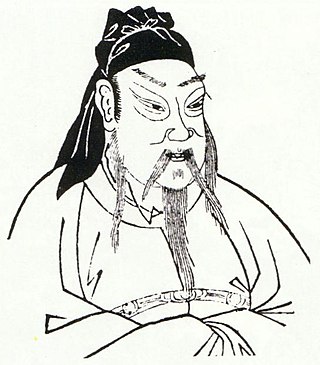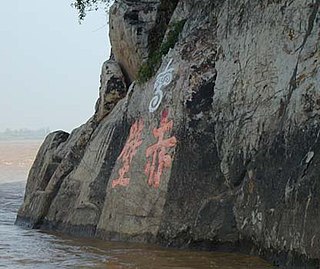
Romance of the Three Kingdoms is a 14th-century historical novel attributed to Luo Guanzhong. It is set in the turbulent years towards the end of the Han dynasty and the Three Kingdoms period in Chinese history, starting in 184 AD and ending with the reunification of the land in 280 by the Western Jin. The novel is based primarily on the Records of the Three Kingdoms, written by Chen Shou in the 3rd century.

Guan Yu, courtesy name Yunchang, was a Chinese military general serving under the warlord Liu Bei during the late Eastern Han dynasty of China. Along with Zhang Fei, he shared a brotherly relationship with Liu Bei and accompanied him on most of his early exploits. Guan Yu played a significant role in the events leading up to the end of the Han dynasty and the establishment of Liu Bei's state of Shu Han during the Three Kingdoms period. While he is remembered for his loyalty towards Liu Bei, he is also known for repaying Cao Cao's kindness by slaying Yan Liang, a general under Cao Cao's rival Yuan Shao, at the Battle of Boma. After Liu Bei gained control of Yi Province in 214, Guan Yu remained in Jing Province to govern and defend the area for about seven years. In 219, while he was away fighting Cao Cao's forces at the Battle of Fancheng, Liu Bei's ally Sun Quan broke the Sun–Liu alliance and sent his general Lü Meng to conquer Liu Bei's territories in Jing Province. By the time Guan Yu found out about the loss of Jing Province after his defeat at Fancheng, it was too late. He was subsequently captured in an ambush by Sun Quan's forces and executed.

Cao Yu was a Chinese playwright, often regarded as one of China's most important playwrights of the 20th century. His best-known works are Thunderstorm (1933), Sunrise (1936) and Peking Man (1940). It is largely through the efforts of Cao Yu that the modern Chinese "spoken theatre" took root in 20th century Chinese literature.

The Battle of Red Cliffs, also known as the Battle of Chibi, was a decisive naval battle in the winter of AD 208–209 at the end of the Han dynasty, about twelve years prior to the beginning of the Three Kingdoms period in Chinese history. The battle was fought between the allied forces of the southern warlords Sun Quan, Liu Bei, and Liu Qi against the numerically superior forces of the northern warlord Cao Cao. Liu Bei and Sun Quan frustrated Cao Cao's effort to conquer the land south of the Yangtze River and reunite the territory of the Eastern Han dynasty.

The Savage Land is a 1987 Chinese-language western-style opera by composer Jin Xiang to a libretto by Wan Fang after her own father Cao Yu's 1937 play The Wilderness. It was performed at the John F. Kennedy Center for the Performing Arts in Washington in 1992, in 1997 at the Saarländisches Staatstheater in Saarbrücken under the baton of You-Sheng Lin, then again in Vancouver in 1998. Shenzhen Youth Opera presented Jin Xiang's work in 2016.

Red Cliff or Chibi is a 2008–2009 internationally co-produced epic war film, based on the Battle of Red Cliffs and the events at the end of the Han dynasty and immediately prior to the Three Kingdoms period in Imperial China. The film was directed by John Woo, and stars Tony Leung Chiu-wai, Takeshi Kaneshiro, Zhang Fengyi, Chang Chen, Zhao Wei, Hu Jun, and Lin Chi-ling. It was Woo's first major film since 2003's Paycheck and his first Chinese-language feature since 1992's Hard Boiled, also starring Leung.

Three Kingdoms: Resurrection of the Dragon is a 2008 Hong Kong action war drama film loosely based on parts of the 14th-century Chinese classical novel Romance of the Three Kingdoms. It was directed by Daniel Lee with a reported budget of US$25 million. The film is a joint production between Hong Kong, China and South Korea.
A thunderstorm is a storm characterized by the presence of thunder and lightning.
Thunderstorm is a play written in 1933 by the Chinese dramatist Cao Yu. It is one of the most popular Chinese dramatic works of the period prior to the Japanese invasion of China in 1937.
Li Lingyu is a Chinese singer and actress.
Cao is the pinyin romanization of the Chinese surname 曹 (Cáo). It is listed 26th in the Song-era Hundred Family Surnames poem. Cao is romanized as "Tsao" in Wade-Giles (Ts'ao), which is widely adopted in Taiwan, although the apostrophe is often omitted in practice. It is romanized "Cho", "Tso", and "Chaw" in Cantonese; "Chou", "Chô", and "Chow" in Hokkien; and "Chau", "Chow" in Teochew. It is romanized "Zau" or "Dzau" in Shanghainese.
Chinese contemporary classical opera is a musical art form drawing on western opera traditions - distinct from modern developments of traditional Chinese opera.

Shanghai Opera House is the official government-funded western-style opera company of Shanghai, China, and the resident opera company at the new Shanghai Grand Theatre. Although the term "Opera House" is often applied to the building, both in English and Chinese texts, officially the building is not an opera house and the term "Shanghai Opera House" properly applies only to the performing company, not the building, as is also true for its senior sister company, the China National Opera House (CNOH) in Beijing. The reason for the distinction is found in that the Chinese character Yuan (院) applies primarily to a school or institute or dramatic troupe rather than the building in which a school, institute or dramatic company resides.
Jin Xiang was a Chinese composer and conductor. He studied composition at the China Central Conservatory from 1954. In 1959 he received his Bachelor of Arts in Composition. Since being labelled a rightist in 1957, he was sent to work in Art Troupe of Aksu Prefecture after graduation, and had to labor at the same time. In 1973, he became a conductor of Orchestra of Song and Dance Ensemble of Xinjiang Song, Dance and Drama Theatre. After the Cultural Revolution he returned to Beijing and was conductor and composer in residence of the Orchestra of Beijing Song and Dance Ensemble from 1979–1984. Jin Xiang came to the United States in 1988 and was a visiting scholar at the Juilliard School in 1998 and the University of Washington and the composer-in-residence at the Washington National Opera. From 1994-1995 he was the Art Director of the China Performing Administration Centre of the Ministry of Culture. In 1996, he founded and was the president of the East-West Music Exchange Association, a non-profit that promoted the exchange of eastern and western music.

Xun is the Mandarin pinyin romanization of the Chinese surname written 荀 in Chinese character. It is romanized Hsün in Wade–Giles. Xun is the 201st surname in the Song dynasty classic text Hundred Family Surnames. It is not among the top 300 most common Chinese surnames.
Wan Fang is a Chinese playwright, novelist, and screenwriter. She was awarded the Lao She Literary Award in 2014. Her father was Cao Yu (1910—1996), one of China's best-known playwrights.

Sunrise (日出) is a 2015 Chinese contemporary classical opera by Jin Xiang to a libretto by Wan Fang after her father Cao Yu's 1936 play of the same name. Jin Xiang had previously cooperated with Wan Fang to set another of her father's plays as the opera The Savage Land.
The Wilderness or The Savage Land is a 1936 play by Cao Yu. The play was influenced by Eugene O'Neill's expressionist theatre and relates a succession of murders and stories of revenge set in a forest. At the time the play was published, social realism was the rage in China, and critics were not pleased with the work's supernatural and fantastical elements. There was a resurgence of interest in The Wilderness in 1980, however, and Cao Yu, then 70 years old, collaborated in staging a production of his play. Other notable modern stagings include that of Wang Yansong in 2006.
The Savage Land is a 1981 Chinese film directed by Ling Zi to a screenplay Si Ji after the play of the same name by Cao Yu. The film features Liu Xiaoqing as the female lead, Yang Zaibao, and Bu Min. The film was shown in Venice, but not released in China till 1987.
Yuan Ye or Yuanye may refer to:









